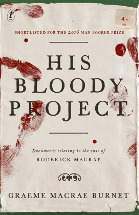His Bloody Project. Documents relating to the case of Roderick Macrae by Graeme Macrae Burnet

Text, 2016. ISBN 9781925498257
(Age: Capable senior students) Recommended. Shortlisted for the Man
Booker prize 2016. His Bloody Project is clearly subtitled
as a novel, which is a useful guide as the book has the authenticity
of a historical investigation. It has also been described as a
'crime story', that is, a story about a crime and not a 'crime
novel'. The text is comprised of a number of sets of documents,
including reports from the crime scene, the accused's thoughts
written in prison, an account from a psychiatrist engaged to assess
the accused and press reports written during and after the trial.
The accused is Roderick Macrae, the son of a poor crofter living in
a remote village in the Scottish Highlands in 1869. The reader
learns that Roderick, aged 16, has admitted to brutally murdering
the constable of the village. The crime scene documents detail
events seen by a number of villagers who are all shocked and some of
whom are sympathetic to Roderick. They agree that he was seen
walking to the constable's house with several agricultural
implements and returning covered in blood. However, attitudes to the
boy differ. The school teacher attests that Roderick was a clever
student, a neighbour that he was treated too severely by his father,
but the minister that he was wicked and retarded. Roderick's
statement is written in gaol at the behest of his lawyer. The reader
is given a clear picture of the hardship and deprivation that was
part of Roderick's life, though Roderick does not acknowledge that
his own circumstances are any more difficult than anyone else's.
Roderick's father is a dour, punitive man who seems to accept and
administer hardship with a religious zeal. He is a poor farmer and
father, and sends Roderick to work for the laird despite the teacher
recommending further education. Roderick is dismissed as unsuitable
and so is unable to help with the family's finances. Motivation for
the murder is provided when the constable harasses the family and
finally deprives them of their land. Roderick's lawyer is moved by
the statement and hoping for a verdict of insanity engages a
psychiatrist. The psychiatrist's report illustrates the nature of
psychiatry at that time more than the character of Roderick. Doctor
Thompson is supposedly an expert in the criminal mind. He has no
interest in Roderick himself and little in justice but rather is
concerned with proving his own theories about the criminal
physiognomy and the criminal class. He is unimpressed by Roddy's
writing though to the reader it seems thoughtful and humble. Doctor
Thompson travels to Roddy's village and reinforces his theories by
categorizing the villagers as stereotypes of the lowest class.
Finally, the newspaper accounts relay the trial and its unsurprising
conclusion.
The book is convincing and is a disturbing look at poverty and
victimisation. It also, with its use of multiple voices and
viewpoints, powerfully illustrates the impossibility of truly
understanding the minds of others. It is recommended for capable
senior readers.
Jenny Hamilton